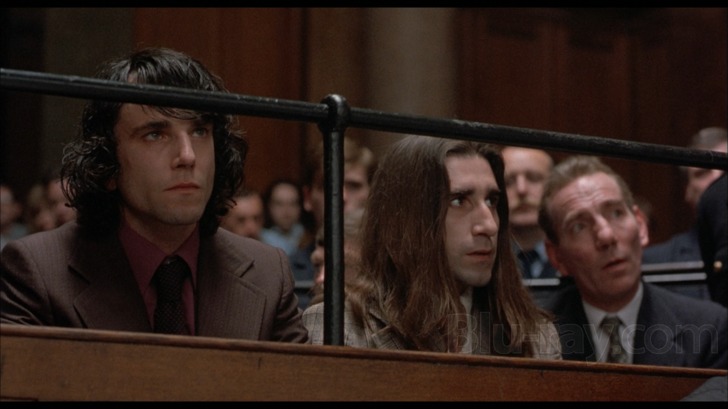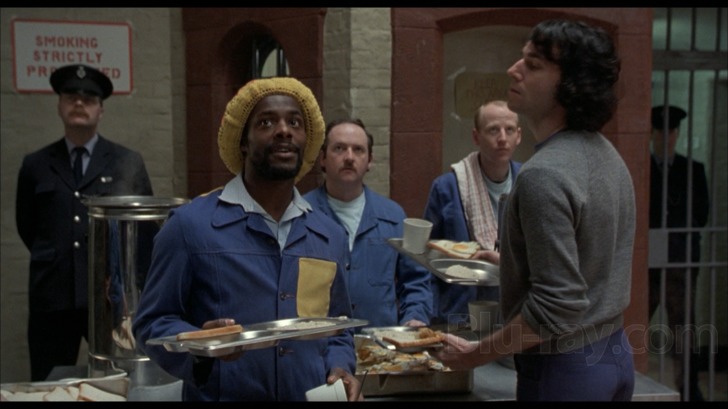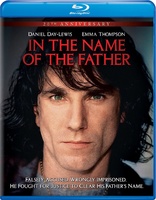In the Name of the Father Blu-ray Movie
HomeIn the Name of the Father Blu-ray Movie 
Universal Studios | 1993 | 133 min | Rated R | May 07, 2013Movie rating
8 | / 10 |
Blu-ray rating
| Users | 0.0 | |
| Reviewer | 4.0 | |
| Overall | 4.0 |
Overview
In the Name of the Father (1993)
Based on the book 'Proved Innocent', by Gerry Conlon, the true story of the group of Irishmen dubbed the Guildford Four, who were the victims of a miscarriage of justice which saw them convicted of bombing a soldiers' pub in 1974. Daniel Day-Lewis plays Belfast wideboy and petty crook Gerry Conlon, who, along with his father (Pete Postlethwaite) and two friends, is forced into a false confession, claiming responsibility for the terrorist attack. 'My Left Foot' director Jim Sheridan focuses on the father-son relationship, as well as the long-running appeal against their sentences, led by their determined solicitor (Emma Thompson).
Starring: Daniel Day-Lewis, Emma Thompson, Pete Postlethwaite, Gerard McSorley, Nye HeronDirector: Jim Sheridan (I)
| Biography | Uncertain |
| History | Uncertain |
| Period | Uncertain |
| Thriller | Uncertain |
| Drama | Uncertain |
| Crime | Uncertain |
Specifications
Video
Video codec: VC-1
Video resolution: 1080p
Aspect ratio: 1.85:1
Original aspect ratio: 1.85:1
Audio
English: DTS-HD Master Audio 5.1 (48kHz, 24-bit)
French: DTS 5.1
DTS: 768 kbps, 48kHz, 24-bit
Subtitles
English SDH, French, Spanish
Discs
50GB Blu-ray Disc
Single disc (1 BD)
Playback
Region free
Review
Rating summary
| Movie | 4.5 | |
| Video | 3.5 | |
| Audio | 4.0 | |
| Extras | 0.0 | |
| Overall | 4.0 |
In the Name of the Father Blu-ray Movie Review
That was then, this is now.
Reviewed by Jeffrey Kauffman May 5, 2013It probably goes without saying that Daniel Day-Lewis is among the most esteemed actors of his generation, and some might argue that he is the most esteemed actor of his generation. Day-Lewis became the only performer to have won three Best Actor Academy Awards when he was feted this year for Lincoln (trivia buffs will know that Walter Brennan won three Best Supporting Actor Oscars and Katharine Hepburn won four Best Actress awards over the course of her long career, though one of those she had to share with that young upstart Barbra Streisand, so that might average out to 3 1/2.) Day-Lewis has become such a legendary figure for his precise Method approach to his roles that he actually became one of the funniest punchlines of this year’s National Correspondents’ Dinner in Washington, D.C. (the perhaps aptly nicknamed “Nerd Prom”), where an hilarious short film purported to show Steven Spielberg’s follow up to Lincoln, an outing about the current resident of the White House (a certain Mr. Obama), with Spielberg announcing that after wondering who could play the President, he had finally realized the answer was staring him right in the face during the filming of Lincoln: Daniel Day-Lewis. Barack Obama himself then appeared in the short, playing Day-Lewis playing Obama (it’s more confusing to read than it was to see), to uproarious effect. But one has to assume that if given the opportunity (and ignoring the “politically incorrect” firestorm that would arise from such a casting choice), Day-Lewis would have made a perfectly believable Obama, such are the abilities of this impeccably gifted performer. One of Day-Lewis’ non-winning Academy Award nominations came for the 1993-1994 drama In the Name of the Father, a reteaming of Day-Lewis with writer-director Jim Sheridan, the man who had directed Day- Lewis to his first Oscar in My Left Foot in 1989. (That two year release schedule above is due to the fact that Sheridan chose to premiere In the Name of the Father in Ireland—an appropriate choice, given the subject matter—in late 1993, while the worldwide rollout didn’t occur until early 1994.)

“The Troubles”, as they’ve been so euphemistically called through the years, need to be understood in order to place at least some of what happens in In the Name of the Father in context, though the film’s general thesis of a massive injustice being perpetrated against innocent people can certainly be understood outside of the film’s sociopolitical milieu. At the core of this conflict is a heady mix of national and religious identity issues. Northern Ireland, unlike Ireland itself, has a Protestant majority and a Catholic minority, and decades (some might say centuries) of discrimination against that minority had reached a boiling point that was only exacerbated by the fact that the Catholic minority wanted to expel the supposed British occupiers and reunite their land with the rest of Ireland. Part of this conflict can of course be traced back to the whims of one Henry VIII and his obsession to father a male heir, which had the perhaps unforeseen consequences of divorcing England from the Catholic Church and the creation of the Anglican Church, which then sought to wipe out all vestiges of so-called “Popism”. Part of those attempts included massive influxes of Britishers to Northern Ireland, many of whom were granted land that was usurped from the natives. While Ireland remained relatively independent (any Irish reading this will no doubt want to argue with that assessment, but I repeat relatively), Northern Island was almost seen as yet another "colony" of England, being ruled from afar and being dictated to in terms of what it should believe and how it should worship. This conflict and all of its entangled ramifications, which may strike outsiders as patently odd, continues in some form or fashion to this day.
In the Name of the Father begins first with a literal bang as we first see the Guildford Pub being blown apart by an bomb planted by the Provisional Irish Republican Army and then with a framing device that allows Gerry Conlon (Daniel Day-Lewis) to narrate snatches of the film and to provide some context. An attorney named Gareth Peirce (Emma Thompson) is driving around London while listening to cassettes of Conlon in her car. Conlon begins to relate the tortuous history of his adult life. While some aspects of this true story have been at least slightly fictionalized, quite a bit of what it portrays actually happened. Gerry Conlon isn’t exactly a meek and retiring soul and in fact has been engaged in some petty criminal activity as Conlon's memories begin, activity which ironically gets him in trouble with both the IRA and the occupying British forces. His well meaning parents, including his father Giuseppe (Pete Postlewaithe, another Oscar nominee for this film), decide that it’s probably best to get Gerry out of Belfast for a while and send him to London, a place where Gerry’s tendencies toward hedonistic pursuits have plenty of opportunity to flower. Gerry makes a spectacularly ill timed return to Belfast with an uncharacteristically large amount of money (due to having robbed a prostitute's flat) in the wake of a disastrous pub bombing masterminded by the P-IRA (a "militia" of the Catholic Northern Ireland minority dedicated to getting the British out of their land) that has left several British soldiers and one civilian dead. Gerry soon becomes one of the prime suspects in the bombing and finds himself hauled away to prison in London. Gerry’s concerned father also travels to London, but soon finds himself swept up in the rabid investigation and is soon jailed himself as a co-conspirator.
Without belaboring what takes up the bulk of the middle section of the film, suffice it to say a horrifying travesty of justice ensues, with Gerry, his father and several other innocent people wrongly accused and convicted (twice—once on appeal) of having masterminded the Guildford bombing. The film moves on to a devastating portrayal of the two Conlons, father and son, locked up together in prison (one of the few silver linings in this scenario is that the two are allowed to room together, though there is a bit of family dysfunction that may keep part of that silver lining hidden from Gerry at least). What’s ultimately so horrifying about this turn of events is that the police knew almost instantly that the Conlons had absolutely nothing to do with Guildford and yet they sat on the evidence, for no really good reason (could there have been a good reason?). Gareth Peirce almost by accident discovers the cover-up and is finally able to achieve a modicum of salvation, albeit too late for one major character.
What’s so frighteningly prescient about In the Name of the Father, and something that is almost incredibly relevant due to the heated debate (and rhetoric) that has recently sprung up in the wake of the abhorrent Boston Marathon bombings, is how a government should respond to terrorism. In the wake of repeated IRA terrorist attacks, the British Parliament had enacted a very tough anti-terrorism law that allowed them to hold any suspects for up to seven days without charging them with anything. This actually sounds relatively reasonable given the current state of affairs where enemy combatants are held in a sort of judicial limbo seemingly forever, which is of course part of the major national debate we in America have been having for years. This debate has also focused on the recent Boston case with some wondering why the surviving suspect was “Mirandized” so quickly and not forced to undergo weeks (if not months or years) of interrogation. In the Name of the Father makes a very potent case that governmental overreach is all that led to the (forced) confessions of Gerry and his cohorts, simply because they were being tortured and threatened with horrifying potential calamities if they didn’t “come clean”.
The film is a devastating emotional experience if only because Conlon, obviously no angel (as one of his own relatives mentions at one point), is so completely powerless in the situation. Sheridan and his co-writer Terry George keep things focused on the human toll this sad state of events exacted on Conlon and the other innocent defendants rather than dwelling on the underlying political (and religious) subtexts (though those are certainly well in evidence). It was a brilliantly incisive film upon its initial release but it seems almost psychically attuned to what we’ve been living through recently. Different religion(s) and a different government, but many of the same issues roil around those of us in the United States even now and In the Name of the Father is a cautionary tale that offers some disturbingly compelling portraits of imbalances that can occur when terrorism rears its exceedingly ugly head.
In the Name of the Father Blu-ray Movie, Video Quality 

In the Name of the Father is presented on Blu-ray courtesy of Universal Studios with a VC-1 encoded 1080p transfer in 1.85:1. Perhaps surprisingly given that this is a Universal catalog release, it has not been DNR'd to death, and fine grain is still quite evident throughout this presentation. The biggest issue some may have with this transfer is what appears to be slight fading of the elements, something that often reduces flesh tones to pallid pinks. The image here is not overly sharp, and some midrange and wide range shots are actually pretty soft looking, but close-ups boast considerable fine object detail. (Even in its theatrical exhibition, In the Name of the Father was not a crystal clear looking experience.)
In the Name of the Father Blu-ray Movie, Audio Quality 

In the Name of the Father features a lossless DTS-HD Master Audio 5.1 track that tends to focus dialogue front and center but which offers some surprisingly immersive surround activity both courtesy of foley effects as well as the nice score (some songs were co-written by Bono). There's some floorboard shaking LFE in two brief bursts early in the film, but otherwise dynamic range is fairly muted. The scenes in the prison have some really well rendered effects that ably recreate both the cavernous open center section as well as the enclosed cell that the Conlons find themselves in. Dialogue is cleanly and clearly presented with excellent fidelity.
In the Name of the Father Blu-ray Movie, Special Features and Extras 

Unfortunately, there are no supplements on the disc. There isn't even a main menu; the film simply starts and then utilizing the Pop Up Menu offers a few options.
In the Name of the Father Blu-ray Movie, Overall Score and Recommendation 

Wow. As devastating as it is to relive the horrors the Conlons went through, what I personally couldn't help keep thinking about is our current state of affairs, as our own government wrestles with how to deal with terrorists, and the citizenry at large is involved in a fierce debate about how terrorists should be treated. Sadly, the more things change, the more they stay the same, perhaps all the more reason to revisit In the Name of the Father, which features one of Day-Lewis' most commanding performances. This Blu-ray features very good video and excellent audio and comes Highly recommended.
Similar titles
Similar titles you might also like

Mandela: Long Walk to Freedom
2013

Chappaquiddick
2017

The Stanford Prison Experiment
2015

House of Gucci 4K
2021

Cesar Chavez
2014

Lincoln
2012

The Queen
2006

A Mighty Heart
2007

Dark Waters
2019

Argo 4K
2012

The Post
2017

Operation Finale
2018

Wolf Hall
Masterpiece
2015

Papillon
2017

Dallas Buyers Club
2013

The 33
2015

Mary Queen of Scots 4K
2018

A Man for All Seasons
1966

Midnight Express
1978

The 15:17 to Paris
2018

